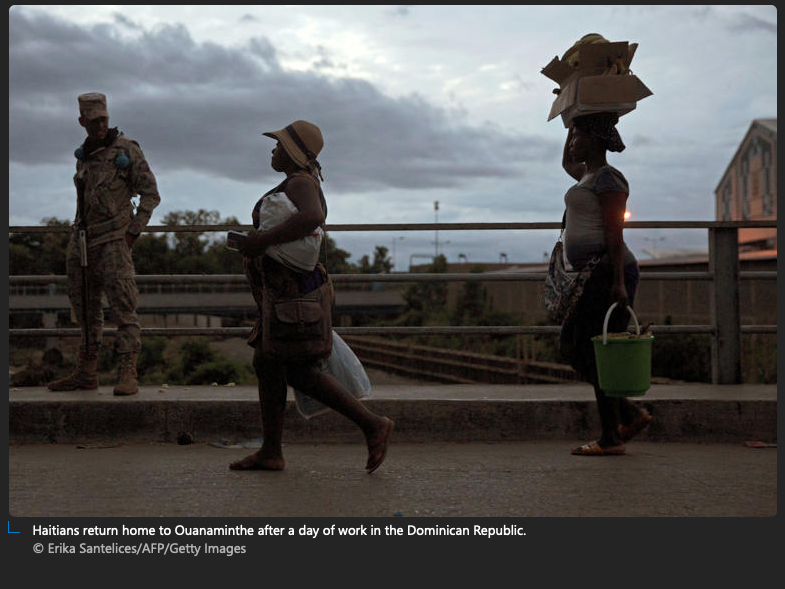PORT-AU-PRINCE, Haiti —The Dominican Republic had already begun building a wall at its border with Haiti. Then it cracked down on immigration, deporting tens of thousands of Haitians back to their impoverished and gang-ravaged country.
Now it’s closing the border entirely.
President Luis Abinader announced the Dominican Republic will shut all of its land, air and sea frontiers with Haiti starting Friday morning, amid a festering dispute over Haiti’s plans to construct a canal off a river that separates the two countries.
The announcement Thursday afternoon significantly escalates tensions between the two nations, which share the Caribbean island of Hispaniola and a long history of strained ties. The closure of Haiti’s only land border threatens to worsen the crisis in a country on the brink of collapse.
Ida Sawyer, crisis and conflict director at Human Rights Watch, said shutting the border would be “yet another demonstration of how the world is failing and abandoning the Haitian people.”
“A border closure would essentially lock Haitians within their country amid extreme levels of violence, including large-scale killings, kidnappings and rapes,” she said in a statement, “and with much of the population struggling to feed their families or access clean water and health care.”
In a statement on Thursday, Haiti’s ministry of culture and communication said it had taken note of Abinader’s “unilateral” decision, which came as a technical delegation from Haiti was meeting with its Dominican counterparts to find a solution to the dispute.
“The government of the republic of Haiti will take all measures as of law to protect the interests of the Haitian people,” it said.
At issue in the dispute is a canal off the Massacre River, which would irrigate more than 7,400 acres of land in Haiti’s Maribaroux plain when completed.
Dominican officials argue that the planned canal would violate a 1929 treaty that governs the fair use of waterways along their shared border. Under that treaty, both countries may equitably use those waters for irrigation, industry and agriculture, but may not alter their “natural course.”
They alleged this week that the canal’s construction has been promoted by business executives and politicians who do not have the backing of the Haitian government, which they charge is incapable of resolving internal conflicts as criminal organizations take control of the country.
Abinader, who is seeking reelection for president next year, said he is activating troops to enforce the closure. He called the canal project “nonsensical,” a “totally inadequate construction without any type of engineering” and a “provocation that this government is not going to accept.”
But Haitian officials argue that the canal project is not in violation of the treaty, and critics of the closure charge that nationalist politicians in the Dominican Republic are seeking to capitalize on anti-Haitian sentiment to drum up support ahead of next year’s elections.
“The canal issue is just an element to reactivate hatred,” said the Rev. Germain Clerveau, a Haitian priest living in Haiti near the Dominican border.
Dominican Republic sending children, pregnant migrants back to Haiti
Disputes over the canal have bubbled up before.
In 2021, after one such conflict, Haitian and Dominican officials signed a joint declaration that established a binational technical group responsible for managing water resources along their shared border. They said the work that had been started on the canal did not “consist of a diversion of the river bed” and did not violate the 1929 treaty.
Work on the canal ceased later that year after Haitian President Jovenel Moïse was assassinated in July. Almost 65 percent of the work on the canal was complete, said Maismy-Mary Fleurant, a Haitian lawyer who was a consultant to the Haitian embassy in the Dominican Republic during the 2021 dispute. Local farmers resumed construction this year.
Fleurant, a former officer with the U.N. high commissioner for human rights, called the border closure an “aggressive and hostile act toward a neighboring state with which we share an island and are not at war with.”
“These actions are not driven by concerns for international law,” he said, “but rather by local politicians aimed at demonstrating who can be the most vehemently anti-Haitian. Unfortunately, Haitians consistently bear the brunt of these local political maneuvers.”
Parts of the border were already closed, and Abinader had threatened to block off the rest of it if the two countries couldn’t come to an agreement over the canal. The U.S. Embassy in Santo Domingo warned U.S. citizens this week that if the frontier was closed, the U.S. government would not be able to facilitate entry into the country from Haiti.
As of Thursday, the main airline offering flights between the two countries and buses operating across the border both announcedthe suspension of trips. .
Rev. Osvaldo Concepción, a Jesuit priest who works closely with Haitians in the Dominican Republic, said some members of the Haitian community are planning on returning to their country due to fears of anti-Haitian violence.
Abinader said he plans to keep the border closed as long as necessary.
“As you know, the Haitian government has a control problem in its territory,” Abinader said. “And if things are uncontrollable there, they will be uncontrollable for the Haitian government, but they will not be uncontrollable for the government of the Dominican Republic.”
Haiti was already the poorest country in the hemisphere before Moïse’s assassination . Since then, much of the country has descended into lawlessness, with gangs controlling large swaths of its capital and blockinghumanitarian aid.
Haiti’s compounding crises have pushed thousands of refugees across the border into its more prosperous neighbor, a country with a long history of xenophobia against Haitian immigrants.
Officials there have argued that the influx is straining local resources. Abinader has in recent months deported thousands of Haitians, including hundreds of pregnant women and unaccompanied minors, in apparent violation of international conventions and bilateral agreements.
The Dominican Republicdeported more than 170,000 people in 2022, government data shows, more than double the number from the year before. Most were Haitians.
The U.N. refugee agency on Thursday condemned the treatment of pregnant and postpartum Haitian women in the Dominican Republic. When they seek medical care, the agency said, they’re subject to intimidation, detention and deportation.
The Massacre River is itself a symbol of the history of thorny relations between the two countries. It was named after an 18th century battle among European settlers, but is best known today as the site of the 1937 massacre of thousands of Haitians ordered by then-Dominican dictator Rafael Trujillo.
Haitians and Dominicans living near the border generally coexist in peace, said Concepción, the Jesuit priest. Mixed-nationality families live on both sides of the frontier, and hundreds of millions of dollars of formal and informal business takes place along the border each year.
William O’Neill, the U.N.’s expert on human rights in Haiti, warned this week that the country is “almost at a total breakdown” — a situation that closing the border would worsen.
“That would be almost lights out for the economy of Haiti,” O’Neill said at the Wilson Center in Washington on Wednesday.
Milostène Castin, a local leader leading the charge for the canal in Haiti, said “the peasants are determined to persist” in the project.
“Abandoned by the current government, the peasants are defending their rights,” said Smith Augustin, a former ambassador of Haiti to the Dominican Republic, “and the Dominicans are using this as an opportunity to humiliate Haiti once more. The ongoing situation is perplexing and lacks rationality.”
Coletta reported from Toronto and Schmidt reported from Bogotá. Ana Vanessa Herrero contributed to this report from Caracas, Venezuela.




